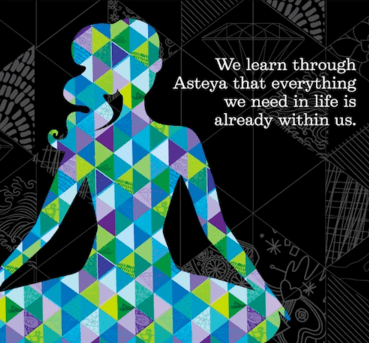This is part of a series on the the basic “do’s” and “don’ts” of Yoga philosophy, called the ‘Yamas’ and ‘Niyamas.’ Previous posts covered the first Yama: ahimsa, or nonviolence, and the second Yama: satya, or non-lying, honesty, and truthfulness.
Beyond my work as a Yoga Therapist, I am currently training as a Spiritual Emergence Coach. Integrative Mental Health for You, The Grof Foundation and The Spiritual Emergence Network serve individuals that are experiencing difficulties with psychospiritual growth, and mental distress. Peers and therapists are trained to approach spiritual emergence with support services and options beyond the current medication-and-therapy model.
Traditional cultures have consistent social support, which allows the inclusion of mental distress to become a part of the cultural fabric. Shamanism has its roots in this concept: celebrating the broad vision of certain individuals and transforming that vision into healing. Through the vision of independent thinkers, individuals and cultures can celebrate and revere the mystery of life.
Having a strong, moral base is essential to go through a Spiritual Emergence transformation successfully. Shifting from fear, stress, confusion and self-absorption to an identification with deep peace, ease and compassion requires a firm foundation based on universal principles common among the world’s great spiritual traditions – being good to your neighbor; being honest; not stealing.
The desire to become of service to others is another outcome of a spiritual emergence/emergency. Maya Angelou said, “As soon as healing takes place, go out and heal somebody else.” Twelve-Step Recovery encourages service to others as a means to move from the crises of disembodiment toward becoming part of the community again by having something to offer. Something to offer, not to take. It is in giving, it has been said, that we receive. What do you have to offer?
The essence of Asteya, as it is called in Yoga philosophy, is pretty straightforward: don’t take what doesn’t belong to you.
How does that apply when incurring debt, or using a credit card? Are we stealing from future income and resources? How about when keeping someone on the phone or in a meeting longer than the quiet, understood time to part and integrate the exchange on one’s own, or staying in a bad relationship? Could this be stealing, somehow, too? Borrowing something and being lazy about returning it but having it nag at you… Withholding generosity and forgiveness – maintaining resentments (this is my big weakness)… Trying to fix other people instead of minding my own business, instead of respecting my individual healing journey…
Hoarding – keeping more than you need instead of sharing what you don’t need – falls under the category of stealing. Hoarding – food, money, possessions – implies not having enough. Being content with what is, with what comes to us by honest means, creates an inner and outer environment of security that goes beyond possessions or wealth. Contentment, happiness, may, in fact, be true wealth.
Curbing our feelings of desires or wants or lack establishes ourselves in the moral principle of non-stealing. We can then reap the riches of what is directly in front of us and observe gratitude for the life we have been given.
I stole from myself for months by not writing this blogpost that I had promised IBPF. I had lots of excuses. I created tension, worry and guilt for myself. By procrastinating, I used up energy that could have flowed to serve. By not willingly giving what I had promised (a blog post on non-stealing!), I was no longer freely given peace of mind.
By feeling that I have not been in the right place, my consciousness and my conscience guided me to recognize the right action to take. I now have more ease.
What could bring you peace of mind right now? How can you give to yourself? To your community?
The reward of practicing non-stealing is the sense and experience that all things come to us when we need them. Being inclusive to others and generous with our experiences allows for generosity, warm fuzzies, abundant friendships and new perspectives.
May this be true for you!
In AUM
Brooke West, B.Sc., RYT is Certified Ananda Yoga ® Therapist. Read the rest of Brooke’s posts for IBPF here, or browse her personal blog.


